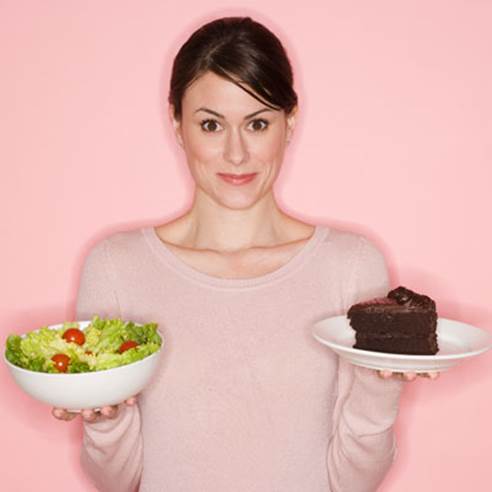Harmonize your hormones in every
decade to knock the years off, inside and out
Want to know the real secret to staying
younger for longer? There’s a miracle anti-ageing ingredient that you won’t find
in even the dearest bottles of skin-saving serum. Instead, this magic formula
responsible for bone, brain, heart and skin health is produced inside your own
body: yup, it’s your hormones. This carefully balanced combination of chemicals
is responsible for regulating almost every aspect of your body and mind, from
your weight to your energy levels and mood but time is your hormones’ nemesis.
Recent research by leading US anti-ageing specialist Dr. Mark Houston
illustrates the dramatic impact your hormones have on ageing: he claims that
the female body ages an equivalent of 18.6 years in the decade between 40 and
50, thanks to the huge drop in the body’s hormone production. But the good news
is that this ticking time bomb of ageing can be defused - there are steps you
can take at every stage of your life to help you stay looking and feeling
younger. Here’s how...
20s fight stress
Your twenties are your prime reproductive
years so your hormones are meant to be in perfect balance, but you can still
fall victim to the ageing effects of hormone malfunction. The culprit? Stress.
‘Stress can dramatically affect hormone production,’ says hormone specialist Dr.
Jan Toledo. ‘In particular, DHEA, which gives energy and focus, can fall low.’
It also triggers too much cortisol. ‘This increases your appetite, decreases
muscle mass, libido and bone density, and contributes to depression and memory
loss,’ says Dr. Natasha Turner, author of The Hormone Diet ($71.5, Rodale
Books). ‘In other words, chronic stress makes us soft, flabby and much older
than we truly are! But, regulating it will keep your fat- burning hormones
revving.’

‘Stress
can dramatically affect hormone production,’ says hormone specialist Dr. Jan
Toledo.
The first step to easing stress is enjoying
life. ‘Laugh, breathe deeply and spend time with good company. Rest, eat whole
food, drink water and exercise,’ says Dr. Claudia Welch, author of Balance Your
Hormones, Balance Your Life
30s clean up your diet
‘For women, progesterone levels begin to
decline in the early to mid-thirties while oestrogen levels actually increase
slightly,’ explains Dr. CW Randolph, author of From Hormone Hell to Hormone
Well ($26.3, Natural Hormone Institute of America). ‘Symptoms typically include
abdominal weight gain, decreased sex drive, increasingly bad PMS, mood swings,
foggy thinking and migraines.’
If you’re experiencing these symptoms, look
carefully at your diet. ‘Lifestyle factors such as a high-sugar diet can really
affect the hormones,’ says Dr. Toledo. ‘If you have a hormone imbalance where
you have lots of oestrogen but not a lot of progesterone, it’s very common to
have carbohydrate and sugar cravings.’ The trouble is, indulging these cravings
only exacerbates the problem, contributing to a further drop in progesterone.
‘It’s a vicious circle,’ says Dr. Toledo. This situation can typically leave
you feeling lethargic and unmotivated, explains hormone health expert Alyssa
Burns-Hill PhD. ‘Hormonal imbalances can have you reaching for carbohydrates
for instant energy and this can prevent you from developing a good exercise
regime because you feel unable to find the energy and motivation. What’s more,
oestrogen dominance can compel you to reach for chocolate, biscuits and cakes
for energy, and coffee and colas for a bit of stimulation to get you through
the afternoon or to help wake you up in the morning.’

If
you’re experiencing these symptoms, look carefully at your diet
You can break this cycle by tweaking your
diet. ‘Go for a diet with plenty of low-G I foods. Avoid coffee and alcohol and
as a general rule reduce your sugar and salt intake, and drink plenty of
water,’ says Dr. Toledo. ‘Avoid processed high-fat snacks. Instead, eat good
fats like cold water fish, raw nuts and seeds. These contain omega-3 oils which
are anti-inflammatory, so they’re particularly good for PMS.’
40s do resistance training
Testosterone levels start to ‘I gradually
decline from your forties and into your fifties, resulting in the dreaded hot
flushes, along with night sweats, vaginal dryness, aching joints and
depression. ‘Testosterone is important for memory, clarity of thinking, energy
and libido. It’s also a very important hormone for the bones to prevent the
development of osteoporosis,’ says Dr. Toledo.
In your forties, your growth hormone levels
also begin to dip rapidly. ‘By 40 nearly everyone is deficient in growth
hormone, and at 80 our levels have diminished by at least 90 per cent,’ says Dr.
Turner. ‘The good news is that strength training three times a week,
incorporating protein at each meal and maintaining good sleep habits will
naturally boost your growth hormone levels, while keeping belly fat at bay.’

‘The
good news is that strength training three times a week, incorporating protein
at each meal and maintaining good sleep habits will naturally boost your growth
hormone levels, while keeping belly fat at bay.’
According to nutritionist Glen Matten,
author of The Health Delusion ($19.5, Hay House), upping the amount of zinc and
magnesium in your diet will boost testosterone levels. ‘Zinc inhibits the
conversion of testosterone to oestrogen,’ explains Glen. ‘Foods such as red
meat, seafood (especially oysters), pumpkin seeds, cocoa and wheat germ are
renowned aphrodisiacs due to their high zinc content.’
Magnesium is also essential for energy and
works with zinc to boost growth hormone, leading to a better libido and a
greater sense of wellbeing, Glen says. But, recent research suggests that 80
per cent of UK women aged 35 to 49 don’t even get 300mg of magnesium a day -
far below the recommended 400mg a day intake. Go for magnesium-rich green leafy
veggies, nuts, legumes and whole grains.
50s ease into menopause
The average age women hit menopause in the
UK is 51, when the body is so oestrogen-deficient that periods no longer occur.
‘During this time, skin begins to thin, not only facially,’ says Dr. Randolph.
‘Weakening of the vaginal lining is common and can result in painful
intercourse and urinary tract infections. Testosterone levels also plummet,
causing more issues with libido, and you may notice foggy thinking and loss of
muscle mass.’
Lowered levels of oestrogen are also
associated with a decrease in serotonin, Dr. Randolph explains, leading to
depression, anxiety, worrying and sleep disruption. ‘This hormonal dip also
increases the risk of insulin resistance, belly fat, inflammation, heart
disease, diabetes, Alzheimer’s disease and osteoporosis,’ he says. Nutritionist
and author of It Must Be My Hormones ($22.5, Michael Joseph) Vicki Edgson says
lifestyle factors can reduce ageing symptoms of oestrogen deficiency
‘Nutritional supplementation, including vitamin D3, is essential at this age,
when the body’s ability to absorb nutrients from food is substantially
diminished.’